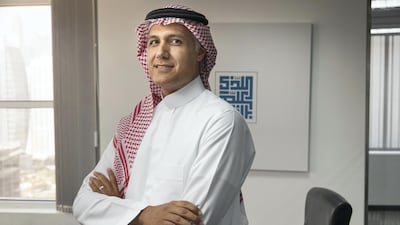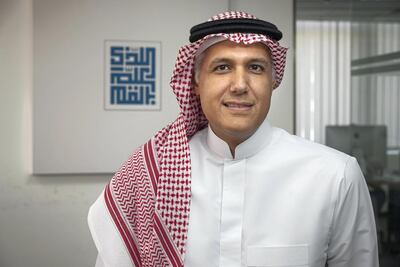It took five years of planning to get Marefa Digital — an Arabic e-learning platform for professionals in the Arabian Gulf — up and running. For its Saudi founders Khaled Alturki and Saad Al Saddiki – long-term residents of the UAE – building their leadership and soft skills development programme, primarily for professionals of Arabian Gulf origin, was not an easy ride.
However, after countless meetings to hammer out the business model, source and produce the content, prepare the pilot and bring the investors on board, their brainchild is now live.
Mr Al Saddiki, whose career includes a long stint with Emirates, has called Dubai home since 1994. Mr Alturki, meanwhile, is a former Mercer executive based in Dubai since 2001.
For the duo, the risks of disrupting their regular incomes as senior human capital development professionals in the UAE always lingered in the back of their minds.
“It was quite risky for us,” says Mr Alturki, Marefa's founder and managing director. "I was about 38 or 39 when I took the decision.”
The hard work has paid off and today Dubai Multi Commodities Centre-based Marefa is much more than a human capital development consultancy, working with government, semi-government and private sector clients.
The company has an ever-expanding library of leadership and soft skills development content designed for professionals of Arabian Gulf origin, which covers a variety of topics from how to develop your communications skills to empowering women in businesses and government entities. It can also provide bespoke content to suit the needs of a particular client.
Mr Alturki says the idea for the company stems from conversations he and Mr Al Saddiki had with their clients almost a decade ago.
“We have been having conversations with the clients on a regular basis about them wanting to have e-learning content in Arabic that is relevant to them,” he says.

At the time, the executives found they could not refer clients to content created specifically for the professional in the region that was cognisant of the cultural sensitivities of the Arabian Gulf states.
“Whatever was available back in those days was basically taken from the Western-developed content and even their translations were not up to the standards,” says Mr Alturki.
The duo recognised the gap in the professional development industry, holding their first discussions to explore the possibility of going into the business of creating content suitable for professionals in the region in 2011.
They made initial inquiries with the local authorities to understand what type of a licence they would require to be able to set up a company — an exercise that turned out to be difficult as there weren’t any specific categories available at the time. As a result, the idea gradually slipped lower on their list of priorities.
“At the time, we were both working for different organisation. You get busy with day-to-day life and you get busy with your own careers and we put it on the back burner,” Mr Alturki says.
He later left Mercer as a principal consultant in 2016 to start his own development consultancy Knowledge Connect (KNCT). That was when Mr Alturki found time to reflect on the concept for Marefa and contacted Mr Al Saddiki to explore how to push the idea forward.
They then approached Cella, a creative film and video production company in Dubai, to create a pilot to present to investors. After feasibility studies were carried out, a pre-seed funding round with friends and family early in 2017 raised Dh1.5 million to get the firm off the ground.
On July 4, the same year, the founders formally launched Marefa. While the human capital development consultancy component has supported the initial revenue generation, it has also helped the business open doors for e-learning mandates with different organisations in the region.
“Our main focus is to contribute to the human capital development in the GCC, by creating localised learning digital content, which appeals specifically to the Arabic speakers in the GCC,” says Mr Alturki.
Previous attempts at creating such content by other entities has not resulted in commercial success, says Mr Alturki, as most learning material was translated, missing the “big element” of cultural sensitivity and regional relevance.
“Our focus today is primarily on GCC nationals,” he says, adding that when a GCC citizen sees a training video, he or she should be able to see themselves in that scenario, recognising how the people featured in the video dress and speak.
To make their content “relevant", the company hires professional actors that speak in the Gulf Arabic dialect and resolve real-life business situations onscreen.
“When I watch this video, I see someone wearing … dishdasha and speaking my dialect. These are very important elements,” says Mr Alturki. The company also uses animation, which has become a key element of the content it produces for future GCC business and government leaders.
In its first seed financing round in 2018, the company raised a further Dh2m when it took the content from its first season of production to the investors.
It is currently focused on refining its content “formula” and plans to do a final seed round, which it hopes to close by raising another Dh3m. Mr Alturki says it will follow this up with a Series A funding round in the second half of next year to scale up the business.
The company is also planning to set up an office in Saudi Arabia, the GCC’s biggest economy, to offer its consultancy and e-learning products to government entities in the kingdom. Mr Alturki adds that discussions are already at an advanced stage with semi-government entities in Saudi Arabia and a major government entity in the UAE.
Q&A: Khaled Alturki, founder and managing director of Marefa Digital
What successful start-up do you wish you had started?
Honestly, Netflix because the way we see ourselves today is that we are the Netflix of e-learning in Arabic. That’s how we portray ourselves. They produce original content themselves. I would have wanted to start that.
What new skills have you learnt from launching Marefa?
I learnt to recognise this is not your child alone and you should let others come and help you along the way. [I also] learnt to trust that everybody has expertise and their own area of specialisation and you have to let go.
If you could do it all again, what would you do differently?
The Learning Management System — if we got to do this differently, I don't think we should invest in that. Also, in terms of funds; instead of doing pre-seed and round one, we could have done them both together as there was a lot of time and effort I had to spend.
What is your next big dream?
I’m still in the middle of the dream.



